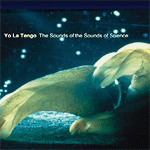|
|
|
|
|
| archive : A B C D E F G H I J K L M N O P Q R S T U V W X Y Z | ||||
|
| ||
 Yo La Tengo
Yo La TengoThe Sounds of the Sounds of Science [Egon; 2002] Rating: 8.0 Who even cares about the ocean anymore? Or the beach, for that matter? If I want to deal with dead fish and syringes I'll take my dad to the supermarket (he has a problem). And that doesn't even address all those alien-style face-huggery things that call the water their home. At least on land animals can be relied upon to have things like eyes; half the crap in the briny deep hasn't even discovered the joys of internal organs. Apparently, though, there are at least a few people who enjoy the ocean-- the French have been particularly enamored of it for several years now, sparking a long tradition of strange and disturbing films documenting the behavior of its contents. Jacques Cousteau may have gotten all the glory on that front, but Jean Painleve had more art in a single reel of his work than Cousteau had in his whole pruny body. Declaring that "science is fiction," Painleve wasn't content to tamely document the exploits of octopi "doing it" as were so many of his contemporaries, preferring instead to arrange his films to not only be enlightening, but entertaining as well (he was hung up on invertebrate intimacy, too-- they all were-- but he was funnier about it). Painleve ventured nearer to his subjects than scientific interest would dictate, artificially imbuing them with distinctly human characteristics like rage and sexuality through the careful editing and scoring of his films. It didn't win him any points with the scientists, but the French surrealists invited him to all their picnics. Flash forward to April 2001, the San Francisco Film Festival: eight of Painleve's most famous shorts (films, that is) are scheduled to be displayed, and Yo La Tengo is asked to write and perform a live score. Long story short, history is born. In case you missed it, don't fret-- your friends in Yo La Tengo have gone to great lengths in the studio to bring you The Sounds of the Sounds of Science, and you ought to thank them. It's not a throwback to their earlier scattershot aesthetics, but that's obvious (it's a score for underwater documentaries, after all), and anyone who's well-versed with the dream-inspiring tunes from And Then Nothing Turned Itself Inside-Out should have no trouble submerging themselves within these soothing aural vignettes. Each track was written to accompany a specific piece of Painleve's work, and Yo la Tengo's level of success ranges from impressive to downright incredible. For the few of these films that I've been fortunate enough to see, the Hoboken three captured the feel of each short damn near perfectly, and crafted songs so moving and evocative for the remainder that by the end of the album I felt as though I'd seen them all. Even when the album 'picks up,' it still never strays far from a relaxed exploration of the lush organics they're able to draw from their standard rock setup, aided here by assorted percussive oddities (vibraphones, chimes, etc). As calm as their most recent work has been, a more natural touchstone for The Sounds of the Sounds of Science is the Future Sound of London's Lifeforms. Some ambient music seems to want nothing more than to be the next employee pick at Natural Wonders or some other ridiculous hippy emporium, but the best of this genre isn't willing to fade into the wasteland of new-age background music. Brilliance along the lines of Aphex Twin's Selected Ambient Works II isn't so passive-- listening creates a sense of revelation, completely enfolding the listener in its wet, glowy womb. The Sounds of the Sounds of Science, over the course of 77 minutes, manages to do that. In fact, within the realm of organic ambient, Yo La Tengo may even have an advantage over a few of the reigning techno acts. If the techno-organic creatures of Lifeforms come from Mars, Yo La Tengo's are distinctly Earthbound in keeping with the subject matter of these documentaries, owing mainly to the human qualities of the sprawling, emotive performance. Each song is an epic, sometimes changing course two or more times before concluding. "The Sea Horse" chronicles the male sea horse giving birth in dramatic fashion; "How Jellyfishes are Born" illustrates the diversity among jellyfishes, um, giving birth; and for a change of pace, "The Love Life of the Octopus" is about birth preliminaries (I promised you octopus sex). Naturally, Yo La Tengo doesn't let the thematic similarity stifle them-- each cut is vibrant and unique, capturing its scene with colorful tonality. "Shrimp Stories" may be the album's single fault. Some of Yo La Tengo's famous diversity shows up in this free-jazz inspired standout, but for this record's purposes it just seems out of place. Mainly, The Sounds of the Sounds of Science is a document of new environments being unveiled, and "Shrimp Stories" seems painfully mundane in contrast. It's solid, and does well at breaking the pace, but isn't exactly compelling. But this lone misstep aside, the album is remarkably powerful, showing not only that Yo La Tengo are fully capable of penning elaborate film scores, but that their years have earned them a unique adeptness at communicating real emotion, human and otherwise, with conventional instrumentation. Animal porn never sounded so good. -Eric Carr, August 1st, 2002
|
||





